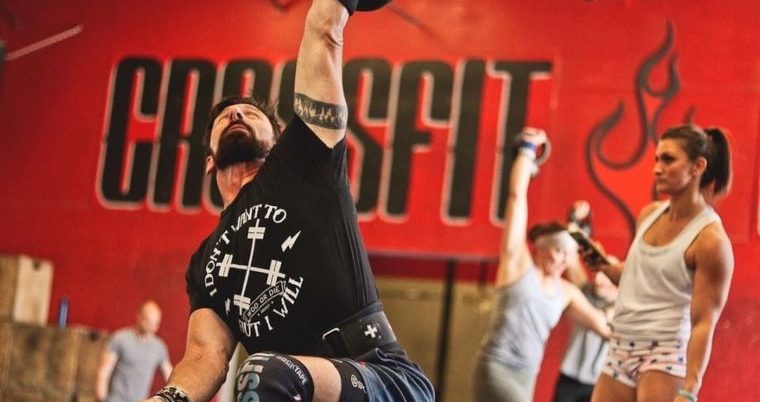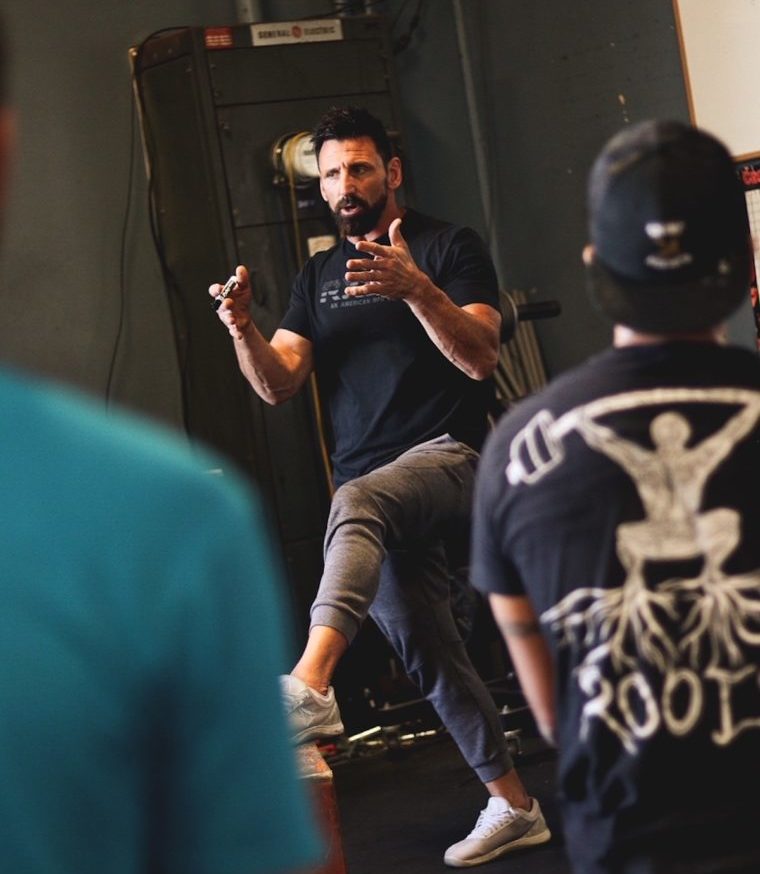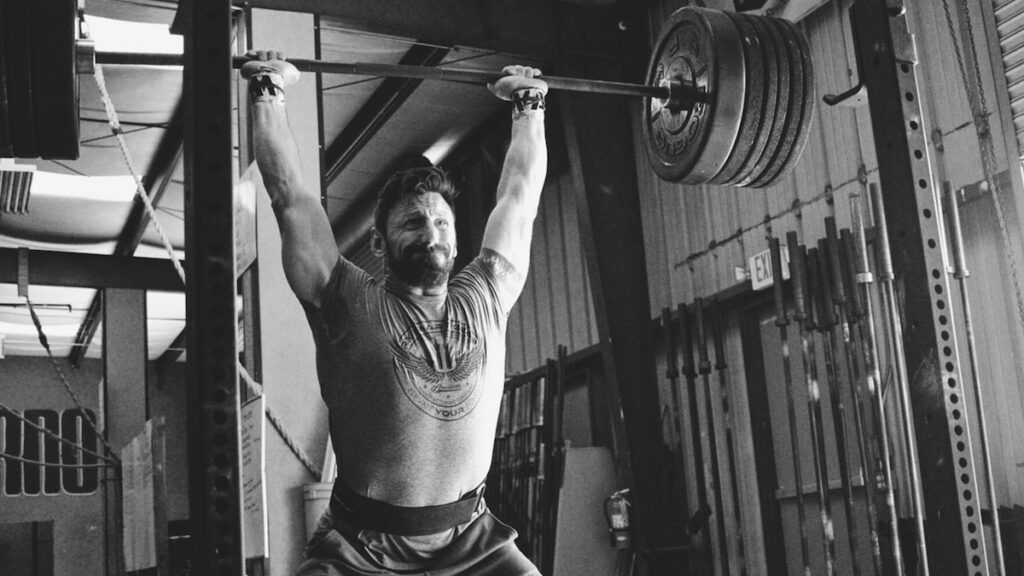When you see someone crushing a workout and having a ton of success, it’s easy to think they’re mentally tough. If an athlete’s running extra sprints, grinding through a heavy squat set, or holding onto the bar for 30 unbroken reps in an Isabel or Grace workout, they must be mentally strong. Right?
Not necessarily. Physical and mental toughness can be connected, but not always.
Physical toughness is where someone is able to do more reps, lift more weight, run faster, jump higher, and hit harder. Your basic badass athlete.
But then why do badass athletes like Olympians, triathletes, football stars, and other top performers fail out of something like SEAL Buds Training? Those that make it through aren’t the toughest physically, but they are the toughest mentally.

How many times have you started a new diet only to cheat on it and eventually fall off the wagon within two to four weeks? How many times have you decided to improve your fitness, and sign up for a gym membership — but then decide not to go because you were tired from work that day? How many times have you decided that you were going to get up early to do work or get ahead of the game only to hit the snooze button over and over again?
In every single one of these situations, your physical toughness won’t keep you on the wagon. Physical strength won’t stop you from picking up the cookie. It’s not going to get you in your car to get you to the gym. And it’s definitely not going to stop you from hitting the snooze button. This is where mental toughness comes into play.
What Is Mental Toughness for Training?
Mental toughness is the ability to not be distracted or derailed from your goal or task. Using one of the examples above, showing mental toughness with your new diet means that you can still go to social events and parties but choose to eat the foods that are in your diet plan. It doesn’t matter if it’s a wedding or trip to Las Vegas or your child’s birthday. You don’t let anything knock you off that track.
When you’ve a tough day at work — or the kids kept you up at night — and you’re fatigued going into regular training time, mental toughness, not pre-workouts, gets you in your car to go to the gym. This doesn’t mean that you will have the best training session ever or that you will be rested and recovered enough to get the maximum benefits on the physical side. But the simple act of getting in your car and driving to the gym and building your mental toughness.
Finally, let’s address the old snooze button. You can be an eight year old child, a 20 year old collegiate athlete, a professional football player, or an aging grandparent and still show a lack of mental toughness by hitting the snooze button instead of getting up as your goal required.
Related: How to break through CrossFit training plateaus.
Can You Train Mental Toughness?
Just as physical toughness takes training to improve, mental toughness must be trained as well, and must be trained daily. The more this is practiced, the more immune you become to outside factors derailing your training routine. Since we’re in the gym, we already have ways to improve our mental toughness through training, which translate to overall mental toughness in life.

Pain and discomfort are safety mechanisms to keep us out of harm’s way. When we’re working out and our muscles are getting fatigued, we feel that burning sensation in our arms and legs. Our bodies are begging us to stop and rest. This feeling of discomfort is trying to protect us from harm, but it doesn’t mean we’re on the brink of disaster. Our bodies are nowhere close to what they can handle physically, and our minds are nowhere close to what they can handle mentally.
When Lance Armstrong was seen as the greatest cyclist of all time, people asked him why he didn’t feel the same amount of pain as the other cyclists. His answer to that (even though it may have been drizzled in PEDs) was that he feels the exact same pain as everybody else. He just didn’t stop when he felt it.
Four Strategies to Improve Mental Toughness
Whether you’re a gym rat or the casual exerciser, improving your mental toughness has benefits in all aspects of life. Here are four simple ways to sharpen your mind and push through challenges.
1. Do One More Rep (The Easiest Technique)
Whether you’re training for an event, or if you just want to improve your overall fitness level, when you get tired, just do one more rep.
Let’s say it’s a 5-round workout of 15 thrusters. Going through rep 8, 9, and 10 on the third round, you feel tired and want to put the bar down to take a break. It’s at this point that you would do one more rep, THEN take that break.
The more you do this, the more you would be able to decide when they should put the bar down rather than the warning signs from your body derail your progress. You physically have the ability but you mentally need to keep yourself on track and this is where the mental toughness comes in. So at anytime you are training, and every time you need to come off the pull-up bar or put the bar down, you first need to do “one more rep.”
2. Stay Engaged In the Workout
The next two techniques have to do with the amount of rest that happens when the bar is down or when you are transitioning from one movement to the next movement. Many times we feel that we push ourselves so hard and do so many reps that we congratulate ourselves with a longer rest. However in most circumstances, fitness style events are not won because someone did reps faster. They are won because there is less rest time, less time where nothing was happening, and more active time that reps are being cut down. There are two parts to this mental training.
Have you ever put the bar down, walked away from it, circled around your area, then finally made your way back to the bar? You just “left” the workout. The first part of this training would be to keep your feet planted right by the bar. When you are closer to the bar and haven’t turned away from it, you are still “engaged” in the workout. You aren’t having to hit the reset button and get re-focused. You stayed in it. By keeping your feet right there, you are training your mental toughness.
3. Count Your Rest Time
Maybe it’s a five second, a 10-second, or a 20-second rest between reps. Taking control of your rest time in this fashion takes mental toughness. To improve this you need to be sure that you are counting seconds, not breaths. You need to make sure that if the goal is a 10 second rest, then the bar is moving at the 10th second, Not the “get to the bar and reshuffle” at the 10 second. Here it’s great to have another coach or friend be there with you to time these breaks. This way, you could have a 3-2-1 countdown at 7-seconds and get you moving again at the 10th second.
Again, this is not a physical toughness characteristic. The ability to get back on the bar regardless of how you feel, or how many reps you did, is a mental game that takes practice and training to improve. This is something that you can do every single day you’re in the gym. No matter what the WOD is, get in the practice of counting your rest time, and then making yourself stay on whatever plan that you decided.

4. Build Consistency In Your Training
We all have lives with a million things going on in them. We have stress with family, jobs, money, school, illnesses, you name it. The easiest thing in the world is to justify not coming to the gym and training because these things have tired you out.
Mental toughness isn’t being able to PR every single day no matter what things you’ve been dealing with in your real life. Mental toughness is the fact that you made it to the gym, or turned on your iPad for the ZOOM class even if you didn’t want to. Keeping that time in your schedule is important. The more often it happens the more regular it is. The more of a habit it becomes and your natural default. This doesn’t mean you have to have a spectacular work out or even do the WOD. It may just mean that you stretch, or that you do the mobility, or that you do the workout but with very low intensity and weight. But you need to get there.
We all know that physical toughness can be improved by doing more work. But what is even more important than during more work is consistency over time. Just by being there you are winning. If you are exhausted and don’t feel like working out, get in your car and drive to the gym anyway. Do the workout at whatever ability you’re able to do based on what you’ve been dealing with. But get there.
If you are injured, this doesn’t mean that you don’t go to the gym. Get in your car and go there anyways. If you are injured you are in rehab mode anyway, so don’t worry about the intensity or the weights that you’re using. But by you being there you are training the mental toughness aspect and, again, fortify those barriers to letting anything derail you from your path.
View this post on Instagram
It Is That Simple
You might be reading this and thinking that these strategies seem way too simple to be effective. But simple doesn’t mean easy. We have all been on that diet when you told yourself that one cookie wouldn’t hurt, or that it was a special occasion and so it was justified to have a piece of cake. We have all been there feeling the burning sensation in our bodies as we are working through a hard session and we have that conversation in our head of “I need to rest a little bit now so that I can do more reps at the end and finish faster.”
But it’s at this very moment that we need our mental toughness. Our level of mental toughness will help us achieve the things we want: the goals in our lives or the tasks.
Mental toughness training obviously goes hand-in-hand with physical training. But mental toughness is needed in all areas of life. And just like your muscles, it needs to be trained regularly and practiced to success. Mental toughness isn’t reserved solely for elite athletes. It’s something for all of us.
We all have the ability to achieve some level of mental toughness, but we need to practice it every day. Take these simple techniques and use them to build your defenses against the world that is trying to derail you from your goals. The stronger your mental toughness becomes, the more you will be able to achieve!
Editor’s note: This article is an op-ed. The views expressed herein and in the video are the author’s and don’t necessarily reflect the views of BarBend. Claims, assertions, opinions, and quotes have been sourced exclusively by the author.